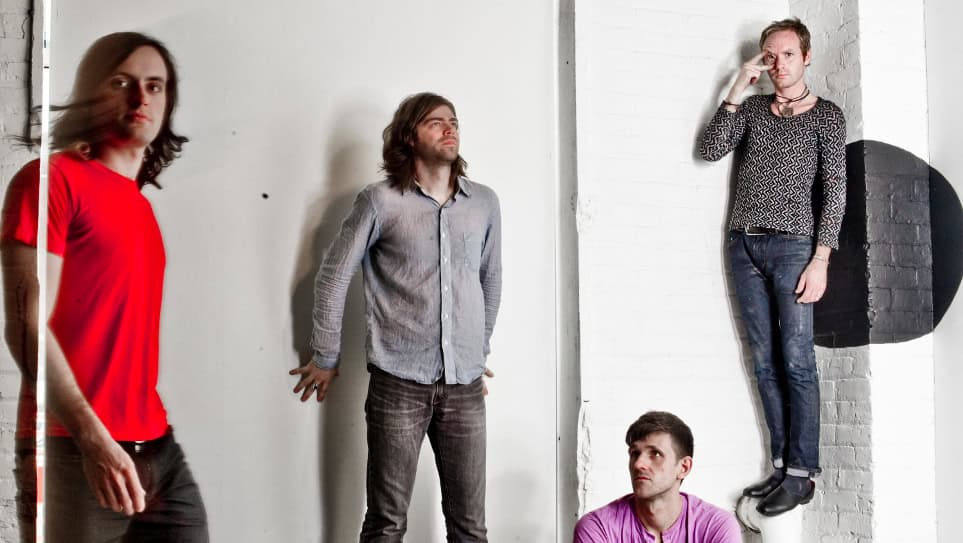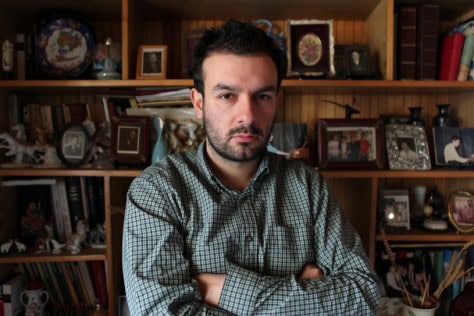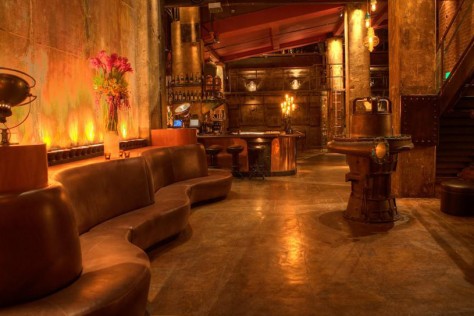“Anything is possible; that’s all we needed to hear.” A cliché statement it may be, but it’s an honest one as Todd Fink looks back on his band’s 18-year span. The Faint have always been a band to embrace the concept of doing what naturally feels right regardless of knowing how to do it or why. But in some special cases, not figuring it out is the key to personal growth, a hell of a journey, and if you’re lucky―success. From their beginnings in a garage in Omaha Nebraska to becoming a staple in the iconic Saddle Creek Records catalog alongside Bright Eyes, The Faint’s still-running career has outlasted countless eras and trends in independent music, keeping them in a category of their own. But what would we call such a category? Not even they would be able to tell you that. I’d say the proper term is dance-party. Yet it’s not the kind of dance party you hit the club for…it’s the kind that you experience live and loud in an ultimate setting, the kind that eliminates any chance of falling asleep upon returning to your bed. I was fortunate enough to catch The Faint at FYF Festival a few months ago and couldn’t get over their energy and enthusiasm, especially considering they haven’t put out another record in about 5 years. It wasn’t until the other day that I received an email about the re-issue of their 2001 release, Danse Macabre. The Faint will be touring again in a couple days, playing that album in its entirety to celebrate its new special edition package for old fans and new. So I figured what better time than now to learn more about The Faint’s history, their commitment to the DIY aesthetic, their way of dealing with the industry, and a little about the Danse Macabre deluxe edition. Read on for my chat with Todd Fink, the man behind it all.
You grew up as a skateboarder prior to forming a band; do you give the lifestyle or ethics behind skating any credit to your attitude toward music? What sort of tapes were you putting in the boombox during skate sessions and were there any bands in particular that served a greater personal impact rather than simply being background music?
Skateboarding was my life until an injury redirected me towards music. I don’t think they are all that different. You to be as artistically expressive as you allow yourself to be with either.
I remember listening to a lot of Public Enemy, KRS-1, Beastie Boys(especially Paul’s Boutique) then later on we loved The Pharcyde and Freestyle Fellowship and some trendy flash in the pan rap stuff. On the rock side I remember lots of thrash metal tapes, Jane’s Addiction, The Cult, old school 80’s punk stuff like TSOL, Dead Kennedys, Damned, The Clash, Buzzcocks, Bad Religion. Then later it was more hardcore underground stuff like Billingsgate, Burn, Shelter which lead into the less macho arty hardcore stuff like Fugazi, Iceburn, Nation of Ulysses, Universal Order of Armageddon, etc. Some of it didn’t age well but a lot of it sounds classic to me now. I’m sure all this stuff played into the music I made later on in one way or another but I probably relate to The Clash and The Buzzcocks the most these days.
Did running into physical problems preventing your ability to skate directly result in you learning to actually play music? Or was starting a band or at least writing songs always on your mind to begin with?
I also had an interest in shooting pool but it was music I ended up spending more time with. My skateboarding friend Joel had a guitar before me I think. We just started playing together. Actually I think the first thing we finished was a cover song for the outro of a homemade skate video. Music just seemed like a natural thing to do.
Was The Faint your first band? During the period of transitioning from skating and being a fan of music to actually becoming a musician, were you thinking about your future in a band? Or were you just playing music and not thinking anything of it?
In 1994-97 the band was called Norman Bailer. We were just doing what we felt like doing. There was no plan. No ambition other than just being able to make a song and play it live.
How did you meet all the other guys in the band? Were you friends with most of them before making music together?
Clark and I are brothers. I was his babysitter so he grew up skating with me. Joel was a skate friend of ours. We met Jacob later when we were looking for someone to play the keyboards. Dapose started off helping us with photoshop but since he’s an amazing guitarist he laid down some awesome guitar lines on Danse Macabre and he’s been with us ever since.
Around ’94 when you guys started playing together, you were losing interest in a lot of the bands and music you were once really into. But there were some local bands that seemed to spark some inspiration for you. What can you say about your experience watching Slow Down Virginia perform at a hole in the wall warehouse? How did they change your perspective of being in a band?
They were weird, high energy, with catchy melodic phrases. They reminded me of the Pixies but with this insane energy! It was clear that hey had made something that no one else could make. It was inviting, inspiring.
When Media came out on Saddle Creek, did it feel like a family was forming? From an outsider’s point of view, it seems like a lot of like-minded artists really came together during that era of Saddle Creek. Did it feel like that at the time, or was it a gradual thing you hardly noticed?
I don’t think we had any idea of how these things usually go. It was the only way we knew. Everyone we hung out with was in a band or was a big fan of the bands. Playing and listening to music was about all we did. There was a lot of support. Sure, I suppose it was like a family on some level.
I find it interesting how most of the band seemed to come from hardcore or punk backgrounds, yet when combined you all seem to really focus on groove and a danceable structure. Besides having a wide taste, what would you say is responsible for this element of The Faint?
I don’t know. As far as structures go, we really just try to let the song decide how it wants to go. We like our music to be fun to perform which can make it turn out dancy. Groove isn’t something we’ve focused on a ton so far although I think we are more interested in it now.
Were you going out much besides concerts? Was there much of a club scene around you growing up to turn you onto more electronic music mainly intended for dancing?
We would go to the gay clubs every once in a while. Just enough to understand that electronic music sounds amazing when it’s played super loud. And, I suppose the mood created by the club lights and fog was something we wanted to create around our own music too.
The Faint is definitely a band to experience live due to the energy of the crowd and the intensity of the performance from all angles. While most bands try to achieve such a result, I find that it’s more common to find these days from electronic-based acts. Are there any DJs or producers today or even the past that use technology in a way you admire? What do you hope people get from your shows?
We have a lot of fun performing. We want people to feel involved. To get physical. To create memories.
When that shift in your sound was developing, I assume you were still searching to discover what felt right for you musically, rather than intending to make adjustments. At what point did it feel like you were satisfied with the way things were sounding in terms of progression?
We felt confident in our direction when we made Blank-Wave Arcade but I don’t think we felt like a competent band until Danse Macabre or so.
Another major element of The Faint is the visual aspect that’s present in your live performances and online media. This is all done by yourselves; which members of the band handle that and how do you think the relationship between audio and visual is important? Would you ever let anyone else do that job for you, or would it not be the same?
We all work on it some. Dapose does the layout for everything and a ton of the content originates from him as well, especially in the videos. I make collages, usually with cut up magazines. Sometimes Dapose will work with those, adapting them and altering them to suit whatever format we need. I think it’s cool for bands to do their own artwork whenever possible but we keep music the first priority. We have considered using a friends artwork in the past. We really just want the artwork and the music to go together. They should help to give each other context.
On the same topic of doing things yourselves, what initiated the decision to self-release Fasciinatiion after a long run working with a label? Is there something pure and more personal about being responsible for every little detail of an album, whether it’s a good thing or bad?
I don’t know. We just thought we’d give it a try. So… it’s hard to put a ton of money into promotion etc. when it’s your own. Not saying that we won’t do it again. 2008 was just a scary time to be investing in anything. CD format was dying fast, record stores were going out of business, the economy was tanking and everyone was talking about how live shows in general weren’t selling well.
When you took a long period of time between releases after Wet From Birth, did you discover anything about yourselves or the process of creating during that span? Without the pressure of deadlines and label heads on your back, it seems like you had the freedom to follow the songs in the direction they truly wanted to go. Would you say that taking your time and allowing flow is an important thing?
Not really. Working fast is where the magic is. After that comes the craft, editing, etc. That part can take a while. I think broad strokes are best. Limitations spur creativity. We just recorded 4 new songs for a white label 12″. That happened very very quickly. We’ll probably develop those songs more though before putting any of them out on a full album.
Now, 11 years after the release of Danse Macabre, what can you say looking back at who you were as a person when it came out? Can you still fully stand behind the songs you wrote, or have things changed in certain ways? Did your beliefs and/or predictions follow through to be accurate of the future?
Yeah, I guess this future is pretty similar to the one I expected, give or take a disaster.
Sure, I can stand behind the songs. Of course I have learned more about my own preferences. I’ve made some realizations about what elements balance out others. For example, my tolerance for sentimental sounding melodies has grown shorter over time. If I sang one now, I’d need another component of the song to lean far in the opposite direction.
Explain the artwork theme of the album and the whole concept behind the full package. Dapose joined you guys to handle the visual side of things and ended up joining the band…
We were into the look of Russian typography posters. We didn’t over think the album concept really. We just figured that if we made the artwork and the music at the same time, they would naturally just make sense together. Oh, you mean the reissue version of Danse Macabre. We want our records to sound good so we’ve started remastering them. While we were at it, we dug up a bunch of pictures, videos, etc. to add to the package. We are just getting together after a couple few years apart. We’re excited to have a new cool version of the album and thought it sounded like fun to play the record live in order to get back into the swing of things. It was fun to learn some of the old stuff but we really just can’t wait to make more new music.
The Faint has been laying a little low for just the last couple of years…what have you all been up to during your downtime? Any writing, or just DJing and side projects?
I have been working on studio productions with Azure Ray, Harouki Zombi, Icky Blossoms, Depressed Buttons etc. And DJing a lot too.
Do you plan on another record, and if so, would it be self-released again?
I could see us going either direction but I don’t think our time is best spent being a label.
And now you’re touring again and playing the full Dance Macabre record in its entirety. Is there any reason in particular for choosing that album to feature in concert?
Just fun. A lot of people first heard our band when that one came out. I’d like to play Blank-Wave Arcade someday too.
Even though the album is a little out of context now, do you still find all the original joy of the material when you’re rehearsing the songs and playing them out to a crowd? Does that feeling ever get old?
I still feel them. We tried to make the songs so each of us liked all the parts. That way we don’t tire of them quickly. It worked in general.
And what’s up with the booklet and DVD included with the re-issue, any special info to share about that stuff?
I don’t know if anyone will want to see a bunch of pseudo scandalous pics and footage from the D.M. era but it’s nice for us to have so much of it in one place.
Tell us a little about the bands supporting The Faint on the tour, how did you discover them?
Icky Blossoms is from Omaha. We have worked pretty closely with these guys. They are amazing. The Casket Girls is a Black Moth Super Rainbow related band but with two spooky sisters singing. Trust, you know Trust right? Melodic gothy techno pop. We love that record.
On the topic of new bands, what are a few recent releases that you’re into that we should check out
You gotta get the new albums from the bands above if you don’t have them.
Alright, before we wrap this up, how about some final words for young musicians just getting started?
Don’t wait until you know what you’re doing.
Thanks so much, looking forward to catching the show here in L.A.!

 Q&A with Larry Gus
Q&A with Larry Gus We Own the Night: The Edison
We Own the Night: The Edison
No Comments